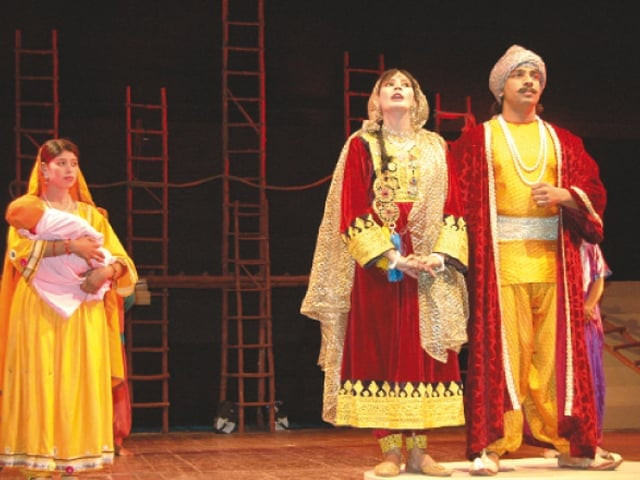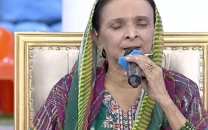Theatrical bows: ‘Chaak Chakkar’: a taut affair, with no excess or shortcomings
Set in Mughal era, artists put up a strong performance in the play at Ajoka Theatre Festival.

Adapted from Bertolt Bercht’s “The Caucasian Chalk Circle”, “Chaak Chakkar” played to a packed hall at Pakistan National Council of the Arts on Saturday. The adaptation, first conceived in 1985, is one of Ajoka’s first productions.
Adapted by the troupe’s staple writer, Shahid Nadeem, and directed by Madiha Gauhar, “Chaak Chakkar” is consummate theatre, being far more composite than yesterday’s performance of “Takkay Da Tamasha”, which itself was a gem in its own right.
While the original was set in Russia, the resurrected adaptation is set in the Mughal era -- a back and forth contention for the throne serves as the backdrop. The cyclical and comedic nature in which power is trumped by even more power and thrones are but precarious things is what makes the play so relevant to today’s Pakistan.
The nameless province in which the play is set is ruled from the Lal Mahal, where the subedar reigns supreme. But his rule is short lived as one of his functionaries Rao Jaber Khan, stages a coup, dethroning him and setting the stage alight.
In the ensuing havoc, the subedar’s wife, while escaping, forgets her lone child. One of her maids, Rano, takes in the child.
Pursued over glen, mountain and stream, she protects the child and calls it her own, her pursuers led by Ajab Khan, unrelenting. She makes her way to her brother in the mountains and is soon married off lest the village gossips about this newly arrived ‘single mother’.
Meanwhile back at the palace, the unrelenting struggle for the throne ends with the subedar’s return. The conveniently forgotten child becomes their immediate concern.
But whose claim to the child is rightful, the mother who forgot him? Or Rano? Sitting in judgement upon this is the loutish villain, Ajab Khan, who in a reversal goes from pursuer to court jester to judge.
Highly crafted and skilfully strung together, “Chak Chakkar” is theatre at its most complete. Whereas yesterday’s play fell upon too many contrivances, Chak is a taut affair, its elements present in the right measure. There is no excess, there are no shortcomings.
We get the story through narration and song; musicians and a sort of MC (a musical narrator), guiding us through this tale, filling in the gaps and becoming almost part of the world itself. The musicians are very rhythmic -- their chiming in is dot on cue and executed to perfection.
The simple prop that lays centre in the stage, fills in for a number of settings, being at times a rampart, a mountain, a bridge, a scaffold and even shelter. It is an inspired creation, quite strange looking when out of context.
The acting as before is exceptional; the scene stealer again being Usman Zia who plays Ajab Khan. Surly, irreverent yet surprisingly insightful and wise, Usman Zia has stage presence by the sackful and talent by the ton. He is a treat to watch.
Sarfraz Ansari as the lead singer and one of the narrators has quite a voice, his recounts like a serenade. Briefly the play does tend to devolve into the slapstick but this is momentary and hardly noticeable. Otherwise the humour is genuine with a real ear to the language with eloquence thrown in at times.
A laudatory effort and quite an experience.
Published in The Express Tribune, January 17th, 2011.



















COMMENTS
Comments are moderated and generally will be posted if they are on-topic and not abusive.
For more information, please see our Comments FAQ